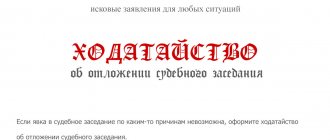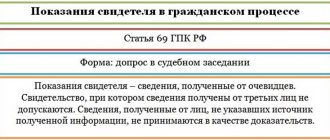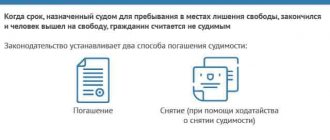The plaintiff and defendant in a civil dispute are required to prove the existence of the circumstances to which they refer during the legal proceedings. Many documents are at the disposal of the participants themselves, some cannot be obtained without the will of the competent government agency. Therefore, the most important tool is a petition to obtain evidence in a civil case.
Petition to request documents
Both in civil and arbitration proceedings, the responsibility for collecting and presenting arguments rests with the participants in the process (Article 57 of the Code of Civil Procedure of the Russian Federation and Article 66 of the Arbitration Procedure Code of the Russian Federation). Evidence is provided by the parties when:
- filing a claim;
- providing a response to the claim;
- filing an application for inclusion of materials, etc.
However, cases cannot be excluded when the parties cannot independently obtain the necessary originals from third parties, commercial organizations or government agencies. In this case, the participant in the process applies to the court with a corresponding petition.
In most cases, such problems arise when the requested documentation contains information that is a secret protected by law. It can be:
- criminal investigation materials;
- information about income/loans;
- health certificates, medical reports, etc.
Such a petition can be submitted at any stage of the process before a decision is made on the case. If the request is justified and it is impossible to obtain information on its own, the court:
- transmits to the applicant a request for presentation to a person who has the necessary information;
- sends the request independently to the location of the materials.
For refusal to provide the requested information, the law provides for fines:
- Article 57 of the Code of Civil Procedure of the Russian Federation provides for a fine of 500 rubles for citizens and 1000 rubles for officials;
- Articles 66 and 119 of the Arbitration Procedure Code of the Russian Federation establish a fine of up to 2,500 rubles for citizens, for officials - up to 5,000 rubles, and for organizations - up to 100,000 rubles.
At the same time, payment of a fine does not relieve the person who has the requested evidence from the obligation to provide it to the court.
What kind of document is this?
From the foregoing, it becomes clear that a petition to obtain evidence is a document in which one of the parties to the trial asks the court to exercise its powers and demand the relevant evidence.
Both the plaintiff and the defendant, in the process of preparing for the court hearing, evaluate the documents they have in their hands and the degree of their evidence. And the need to strengthen your argumentation through documents that cannot be obtained on your own becomes obvious already at this stage. Therefore, as a rule, a petition to obtain evidence in a civil case is filed simultaneously with the main claim. Or at the preliminary hearing stage. But situations are possible when, already during the process, the court will need additional justification for the positions or demands of the parties, and this can only be done with the help of documents inaccessible to the parties.
In such cases, the consideration of the case may be interrupted until the requested documents are provided (or, if the circumstances of the case allow, the court may temporarily move on to examining other evidence).
It must be taken into account that the court under no circumstances searches for evidence, no matter what its nature. This is a matter for the parties to the legal dispute, and the court can only offer to provide additional documents (Part 1 of Article 57 of the Code of Civil Procedure of the Russian Federation).
If the petition is considered positively, the court issues a request, which is binding on all third parties. It specifies who exactly must satisfy it and within what time frame. The request can be served on the author of the petition or sent directly to the executor.
The obligated person must either fulfill the requirement within the period established by the court, or within 5 days after receiving the request, notify the judicial authority of the delay or impossibility of fulfillment, with the obligatory indication of the reasons (Part 3 of Article 57 of the Code of Civil Procedure of the Russian Federation). Refusal to comply with a court request entails a fine of 500 rubles. for individuals and up to 1000 rubles. for officials (part 3 of article 57 of the Code of Civil Procedure of the Russian Federation). At the same time, the imposition of a fine does not relieve one from the need to fulfill a judicial request (Part 4 of Article 57 of the Code of Civil Procedure of the Russian Federation).
The parties to the process, in general, cannot be fined, but if one of the parties avoids providing documents requested by the other party, then this will obviously be perceived negatively by the court.
Features and design rules
In accordance with procedural law, the petition must have the following structure:
- Introductory part. Includes a “header” that indicates the name of the court, full name. and the applicant's contact details, as well as the case number.
- Main part. Here you need to outline the essence of your request: what information needs to be requested, what legally significant circumstances it confirms, why you cannot get it yourself, and who has it.
- Resolution part. In this paragraph, it is necessary to indicate the requirement itself, for example, “I ask you to request reports of road accidents from the Krasnensky Ministry of Internal Affairs of the Belgorod Region.”
- Your signature and date of application. This is followed by a list of applications (if necessary).
Drawing up and submitting an application
According to procedural rules, an application for the provision of documents addressed to the court must include:
- names of the court and details of the parties;
- a brief statement of the essence of the claim;
- name of the required document or other evidence;
- a statement of circumstances affecting the course of legal proceedings that need to be confirmed (refuted) using the requested documents;
- justification of the reasons for the impossibility of obtaining documents by the applicant independently;
- location of the required evidence (address and personal data of the citizen, data of the institution or company where the relevant documentation is located).
To correctly draw up a procedural document, you can use a sample petition for the collection of documents and evidence.
As a rule, courts grant such requests aimed at obtaining important evidentiary documents. A judicial request requiring the presentation of specific documents can be served directly on the interested party who filed the petition, or immediately sent to the place where the relevant documents are requested. In the first case, the interested party independently receives the documentation at its location by submitting a judicial request.
The person or organization served with the subpoena must provide the required documentation. Otherwise, a penalty is imposed - a fine. The imposition of a fine does not relieve one from the obligation to comply with court requests.
Thus, when filing a petition, the likelihood of receiving the necessary evidentiary documentation is quite high.
Petition for the collection of evidence in the arbitration process
Its execution is regulated by Article 66 of the Arbitration Procedure Code and has similar content requirements as in civil proceedings. In addition, the arbitration court has the right to request information on its own initiative:
- if documents were not provided by state bodies in cases arising from public legal relations (clause 5 of article 66 of the Arbitration Procedure Code of the Russian Federation);
- if the applicant did not provide materials in the case of collection of mandatory payments and sanctions (clause 5 of Article 215 of the Arbitration Procedure Code of the Russian Federation);
- if the foreigner has not provided official confirmation of his legal status or right to engage in business or other economic activity (clause 3 of Article 254 of the Arbitration Procedure Code of the Russian Federation).
If the court is not convinced by the arguments presented in the petition and it refuses you, then its decision can be challenged and the petition can be submitted again at the next instance.
What documents can you request?
The law does not contain an exact list of documents subject to demand. The only important thing is that they must relate to the case at hand. The court has no right to request evidence concerning third parties.
Remember! In order for the judge to accept and satisfy the petition, it is necessary to justify the impossibility of obtaining evidence in another way.
As an example, we can consider the situation with the collection of alimony. When filing a lawsuit against her ex-husband, a woman is forced to petition the court to request a certificate of his earnings at his place of work.
She herself cannot obtain such a document, since the law protects the personal data of citizens. In this case, requesting evidence from the court is the only possible way to obtain information.
Watch the video. Sample petition for the collection of evidence in civil proceedings:
Sample application
To the Oktyabrsky District Court, Judge Plaintiff:
Respondent:
APPLICATION for the collection of evidence in a civil case
There is a civil case in your proceedings regarding a claim for the division of jointly acquired property of spouses. In accordance with Art. 56 of the Civil Procedure Code of the Russian Federation, I, as a plaintiff, have the burden of proving legally significant circumstances in the case, which are: / list the circumstances indicating their relevance to the case under consideration
/ I believe that in order to properly resolve the dispute, it is advisable to present the following evidence, which I am not able to obtain on my own: /
list the names of documents and/or other evidence, indicate at what address and who has them
/ Due to the requirements of paragraph 1 of Art. 57 of the Code of Civil Procedure of the Russian Federation, evidence is presented by the parties and other persons participating in the case. The court has the right to invite them to provide additional evidence. If it is difficult for these persons to present the necessary evidence, the court, at their request, provides assistance in collecting and requesting evidence.
Based on the above, guided by art. Art. 35, 57 Code of Civil Procedure of the Russian Federation,
ASK:
Request from the Office of the Federal Service for State Registration, Cadastre and Cartography for the Krasnodar Territory extracts from the Unified State Register of Real Estate on the ownership of real estate objects by Alexander Nikolaevich Pavlenko, as well as information on other property rights to real estate objects. Defendant /signature/ Pavlenko A.N.
Possible reasons for deviation
Typically, courts always grant such requests, since this is largely in their interests: without solid evidence, it will be extremely difficult to make a reasoned decision. However, in some cases, the judge may decide that the request should be denied. The reasons may be as follows:
- It is not indicated which specific documents, and for what specific purposes, must be requested. In this sense, a citizen should be extremely careful. Otherwise, it is unclear what exactly the party wants to prove using these papers.
- It is quite common for a petition to be submitted clearly untimely. For example, if the judge decided that it was time to sum up the results and go to make a decision, and at this moment a request is submitted, he may consider this an abuse of law, citing, for example, Article 10 of the Civil Code. Such justification in some cases may be purely formal, so the citizen should continue to defend his rights while filing an appeal.
- Finally, if a citizen asks for documents that he can obtain himself
In any case, the party whose request is denied may file an appropriate appeal after the decision has been rendered.
How to make an oral request for the inclusion of evidence
I’ll tell you about the algorithm of actions for filing an oral petition for the inclusion of evidence:
- you need to prepare in advance the evidence that you want to attach to the case (for example, bring copies of documents with you to the meeting, have them properly certified, take the original for verification);
- at the beginning of the hearing, the judge will invite the parties to file a motion - they need to stand up, clearly voice their request, describe the evidence, and briefly indicate its relevance to the case;
- the judge must ask the opinion of all participants in the case about the possibility of including evidence (they can object, agree, or leave the question at the discretion of the judge);
- if after discussion the judge decided to attach evidence to the case, all participants in the case can familiarize themselves with it and receive copies (if possible);
- the examination of evidence will take place towards the end of the process, which the judge will definitely explain to the parties.
Find out more How to find a case on the arbitration court website
Note! All oral motions are recorded in the protocol and must be examined by a judge and a ruling is made. Later, you can check whether your petition was included in the minutes, listen to the audio recording of the meeting (it is required to be recorded in any case).
In the same way, you can make an oral request for the inclusion of evidence at any time during the hearing until the judge makes a decision. To announce a request, you need to raise your hand, voice the petition with the permission of the judge, and hand over the evidence for review.
How to prove your position in court?
How to request evidence in court
In addition, the reasons why it is impossible to obtain items or documents that can prove guilt or innocence must be specified. Thus, the court’s assistance in obtaining evidence can play a key role if the strategy is built as competently as possible. The court is obliged to issue a request to the party who does not want to distribute the information; if the request is approved, the party will receive what it needs. This scheme works ideally in courts of general jurisdiction.
When to submit
Each party to the process has the right to ask the court to request evidence (documents) if it objectively cannot obtain it. That is, an individual, a representative of a company or other legal entity can count on the fact that the court, using its powers, will forcibly request papers that:
- objectively necessary to consider the case and make a decision;
- cannot be obtained by the party independently.
It may be necessary in cases where we are talking about the requisition of documents that the other party deliberately withholds, for example:
- The ex-wife filed a claim against her husband for payment of alimony in full. The husband pays them from his salary, but also has other official income (for example, from renting out an apartment). The wife cannot objectively obtain documentary evidence of this fact (request a lease agreement or a bank account statement). Therefore, it is worth filing a petition so that the court makes a decision on the forced collection of documents.
- During the official marriage, the spouses took out a consumer loan and purchased a car with these funds. The loan was taken out in the name of the husband, and the car was also registered in his name. After the divorce, the husband hid all the relevant papers, and at the same time does not consider it necessary to divide the jointly acquired property. Therefore, it makes sense to ask the court to forcefully demand evidence: confirmation of the car’s registration with the traffic police, a loan agreement with a bank, as well as a purchase and sale agreement.
- The employee was on a long business trip, during which the unscrupulous employer fired him “at his own request” by issuing a corresponding order. At the same time, the employee was given a work book and a paycheck, but he cannot ask for an order or an entry in the documentation log. Therefore, you should file a petition and ask the court to compulsorily demand these and other documents.








